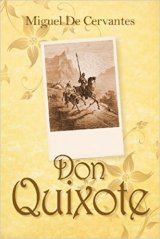Don Quixote Page #19
The Ingenious Nobleman Sir Quixote of La Mancha, or just Don Quixote, is a Spanish novel by Miguel de Cervantes.
"That thou mayest see, Sancho, the good that knight-errantry contains in itself, and how those who fill any office in it are on the high road to be speedily honoured and esteemed by the world, I desire that thou seat thyself here at my side and in the company of these worthy people, and that thou be one with me who am thy master and natural lord, and that thou eat from my plate and drink from whatever I drink from; for the same may be said of knight-errantry as of love, that it levels all." "Great thanks," said Sancho, "but I may tell your worship that provided I have enough to eat, I can eat it as well, or better, standing, and by myself, than seated alongside of an emperor. And indeed, if the truth is to be told, what I eat in my corner without form or fuss has much more relish for me, even though it be bread and onions, than the turkeys of those other tables where I am forced to chew slowly, drink little, wipe my mouth every minute, and cannot sneeze or cough if I want or do other things that are the privileges of liberty and solitude. So, senor, as for these honours which your worship would put upon me as a servant and follower of knight-errantry, exchange them for other things which may be of more use and advantage to me; for these, though I fully acknowledge them as received, I renounce from this moment to the end of the world." "For all that," said Don Quixote, "thou must seat thyself, because him who humbleth himself God exalteth;" and seizing him by the arm he forced him to sit down beside himself. The goatherds did not understand this jargon about squires and knights-errant, and all they did was to eat in silence and stare at their guests, who with great elegance and appetite were stowing away pieces as big as one's fist. The course of meat finished, they spread upon the sheepskins a great heap of parched acorns, and with them they put down a half cheese harder than if it had been made of mortar. All this while the horn was not idle, for it went round so constantly, now full, now empty, like the bucket of a water-wheel, that it soon drained one of the two wine-skins that were in sight. When Don Quixote had quite appeased his appetite he took up a handful of the acorns, and contemplating them attentively delivered himself somewhat in this fashion: "Happy the age, happy the time, to which the ancients gave the name of golden, not because in that fortunate age the gold so coveted in this our iron one was gained without toil, but because they that lived in it knew not the two words "mine" and "thine"! In that blessed age all things were in common; to win the daily food no labour was required of any save to stretch forth his hand and gather it from the sturdy oaks that stood generously inviting him with their sweet ripe fruit. The clear streams and running brooks yielded their savoury limpid waters in noble abundance. The busy and sagacious bees fixed their republic in the clefts of the rocks and hollows of the trees, offering without usance the plenteous produce of their fragrant toil to every hand. The mighty cork trees, unenforced save of their own courtesy, shed the broad light bark that served at first to roof the houses supported by rude stakes, a protection against the inclemency of heaven alone. Then all was peace, all friendship, all concord; as yet the dull share of the crooked plough had not dared to rend and pierce the tender bowels of our first mother that without compulsion yielded from every portion of her broad fertile bosom all that could satisfy, sustain, and delight the children that then possessed her. Then was it that the innocent and fair young shepherdess roamed from vale to vale and hill to hill, with flowing locks, and no more garments than were needful modestly to cover what modesty seeks and ever sought to hide. Nor were their ornaments like those in use to-day, set off by Tyrian purple, and silk tortured in endless fashions, but the wreathed leaves of the green dock and ivy, wherewith they went as bravely and becomingly decked as our Court dames with all the rare and far-fetched artifices that idle curiosity has taught them. Then the love-thoughts of the heart clothed themselves simply and naturally as the heart conceived them, nor sought to commend themselves by forced and rambling verbiage. Fraud, deceit, or malice had then not yet mingled with truth and sincerity. Justice held her ground, undisturbed and unassailed by the efforts of favour and of interest, that now so much impair, pervert, and beset her. Arbitrary law had not yet established itself in the mind of the judge, for then there was no cause to judge and no one to be judged. Maidens and modesty, as I have said, wandered at will alone and unattended, without fear of insult from lawlessness or libertine assault, and if they were undone it was of their own will and pleasure. But now in this hateful age of ours not one is safe, not though some new labyrinth like that of Crete conceal and surround her; even there the pestilence of gallantry will make its way to them through chinks or on the air by the zeal of its accursed importunity, and, despite of all seclusion, lead them to ruin. In defence of these, as time advanced and wickedness increased, the order of knights-errant was instituted, to defend maidens, to protect widows and to succour the orphans and the needy. To this order I belong, brother goatherds, to whom I return thanks for the hospitality and kindly welcome ye offer me and my squire; for though by natural law all living are bound to show favour to knights-errant, yet, seeing that without knowing this obligation ye have welcomed and feasted me, it is right that with all the good-will in my power I should thank you for yours." All this long harangue (which might very well have been spared) our knight delivered because the acorns they gave him reminded him of the golden age; and the whim seized him to address all this unnecessary argument to the goatherds, who listened to him gaping in amazement without saying a word in reply. Sancho likewise held his peace and ate acorns, and paid repeated visits to the second wine-skin, which they had hung up on a cork tree to keep the wine cool. Don Quixote was longer in talking than the supper in finishing, at the end of which one of the goatherds said, "That your worship, senor knight-errant, may say with more truth that we show you hospitality with ready good-will, we will give you amusement and pleasure by making one of our comrades sing: he will be here before long, and he is a very intelligent youth and deep in love, and what is more he can read and write and play on the rebeck to perfection."
Translation
Translate and read this book in other languages:
Select another language:
- - Select -
- 简体中文 (Chinese - Simplified)
- 繁體中文 (Chinese - Traditional)
- Español (Spanish)
- Esperanto (Esperanto)
- 日本語 (Japanese)
- Português (Portuguese)
- Deutsch (German)
- العربية (Arabic)
- Français (French)
- Русский (Russian)
- ಕನ್ನಡ (Kannada)
- 한국어 (Korean)
- עברית (Hebrew)
- Gaeilge (Irish)
- Українська (Ukrainian)
- اردو (Urdu)
- Magyar (Hungarian)
- मानक हिन्दी (Hindi)
- Indonesia (Indonesian)
- Italiano (Italian)
- தமிழ் (Tamil)
- Türkçe (Turkish)
- తెలుగు (Telugu)
- ภาษาไทย (Thai)
- Tiếng Việt (Vietnamese)
- Čeština (Czech)
- Polski (Polish)
- Bahasa Indonesia (Indonesian)
- Românește (Romanian)
- Nederlands (Dutch)
- Ελληνικά (Greek)
- Latinum (Latin)
- Svenska (Swedish)
- Dansk (Danish)
- Suomi (Finnish)
- فارسی (Persian)
- ייִדיש (Yiddish)
- հայերեն (Armenian)
- Norsk (Norwegian)
- English (English)
Citation
Use the citation below to add this book to your bibliography:
Style:MLAChicagoAPA
"Don Quixote Books." Literature.com. STANDS4 LLC, 2025. Web. 6 Feb. 2025. <https://www.literature.com/book/don_quixote_27>.








Discuss this Don Quixote book with the community:
Report Comment
We're doing our best to make sure our content is useful, accurate and safe.
If by any chance you spot an inappropriate comment while navigating through our website please use this form to let us know, and we'll take care of it shortly.
Attachment
You need to be logged in to favorite.
Log In